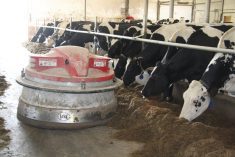QUEBEC CITY – From the five successful young farmers at the front of the room, there had been tales of high hopes, dreams come true, setbacks, heavy debt and deep determination.
What there did not seem to be was doubt about the path they are on.
When they finished, the audience began with applause and ended with a prolonged standing ovation.
Although the stories, the farms and the regions were different, there was a common theme at the Canadian conference on farm succession planning held Aug. 28.
Read Also

Soybean market still figuring out implications of China-U.S. pact
Soybean futures had a muted reaction to the U.S. trade deal with China as the market tries to figure out the nuances of the deal.
“Don’t take no for an answer,” said Nova Scotia’s Jack Thomson as he told the tale of his struggle, along with wife Rhonda, to create a dairy farm at Antigonish.
“Perseverance,” replied Franck and Kari Groeneweg when asked what the key factor was behind their ability to expand from an 1,830-acre farm at Edgeley, Sask., bought in 2003 to 10,000 acres this year.
Thomson’s story was in many ways the most dramatic.
He grew up on a dairy farm but his older brother had the first opportunity to buy the family farm and took it.
In 1998, after 19 months of negotiations and a complicated financing arrangement, the Thomsons purchased a portion of an existing dairy farm. Debt and support from the original owners were key.
They invested in upgrading the operation, renovating the barn and being recognized in the 2004 as Canadian Outstanding Young Farmers.
Then in August 2007, lightning struck and the barn, silos, feed and 40 cows were destroyed. Within months, money was borrowed and a new barn was being built.
Just before Christmas, the house burned down. To overcome all these calamities, the farm has been remortgaged three times.
Thomson said it changed the way they think.
“When we did what wasn’t possible in buying the farm, we thought we were invisible but we’re not.”
His goal is to get the farm into the top 10 percent of milk producers.
After the fires, they never thought of quitting.
“There was nothing else we wanted to do in our lives. We wanted to finish what we started.”
The Groenewegs of Saskatchewan also had their setbacks.
He grew up in France on a farm where land costs, three brothers and a father not interested in retiring convinced him to head to North America. He worked for an Iowa farmer and started a tractor part business exporting to France.
He met Kari, an Alberta girl studying in Iowa, and they began to consider where they could afford to start farming.
Saskatchewan was the place with cheaper and available land and in 2003 they bought 12 quarters, almost doubling the base in 2004 before a killer frost and low prices almost sunk them.
To survive, they started custom farming and a grain-burning stove retail business.
Their lenders thought it was time they moved on, Groeneweg said. Instead, they became creative in their ways to earn a living and he took out a realtor’s license.
Lenders were impressed enough with their determination that since then they have expanded to 2,600 acres owned, 1,800 acres rented and 5,600 custom farmed northeast of Regina.
Their goal, he said, is to own 6,000 acres and crop 20,000.
Kari said 2004 put the beginning farmers into a deep hole.
“We were able by God’s grace to come out of that hole.”
Then there was Quebec farmer Alison Brosseau, who studied agrology and became agricultural account manager at the Desjardins credit union system. In 2006, she left the job to join her husband and his family on a 1,000 acre grain and forage farm. It includes a hormone-free Black Angus herd to serve a niche market and a new organic strawberry operation that produces wine.
She bought 20 percent of the shares. It is an innovative farm where husband Robert Kyle experiments to create new equipment or production methods to increase efficiency. Cash flow also comes from custom farming.
During the past seven years, they have invested almost $3 million to improve the farm.
Shortly after she joined the operation full time, Brosseau lost two fingers in a farm accident.
“One was sewn back on, the other couldn’t be.”
But like the others, she is determined to make a success of it.














